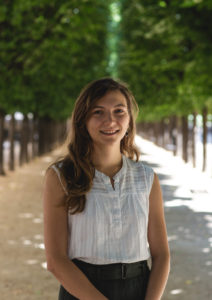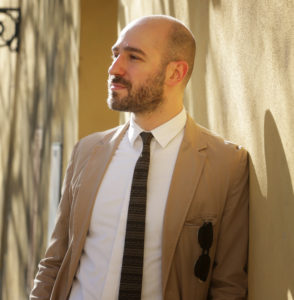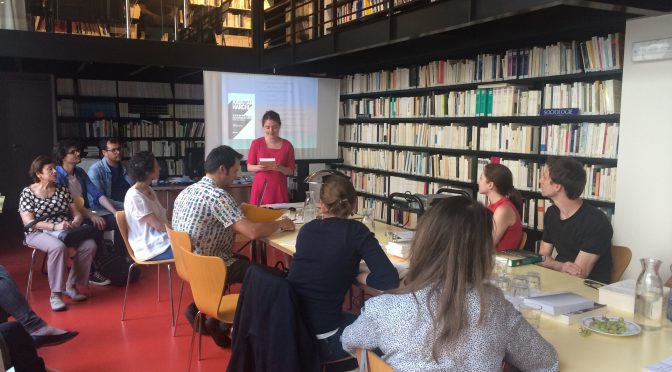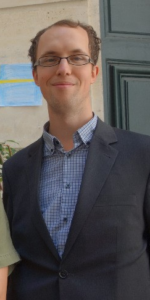The staging and reception of Samuel Beckett’s theatre in France, Germany and the Czech Republic after the fall of the Berlin Wall
Research Area 1 – Displacements, “Dépaysements” and Discrepancies: People, Knowledge and Practices
Contact : alice.clabaut.billier@gmail.com
My dissertation focuses on “the staging and reception of Samuel Beckett’s theatre in France, Germany and the Czech Republic after the fall of the Berlin Wall”. I am doing a joint thesis between Charles University and Sorbonne University (cotutelle contract).
My research aims to establish an aesthetic-political inventory of the staging and reception of Samuel Beckett’s plays in France, in Germany and in the Czech Republic since the playwright’s death. Beckett passed away in December 1989, one month after the fall of the Berlin Wall. The international comparison questions the consequences of the Cold War on the production and reception of Beckett’s plays. The three countries I am interested in faced the experience of the Iron Curtain very differently. Whilst Beckett’s work has always been highly praised in France, it was strictly censored in East Germany. While the Czechs used Waiting for Godot as a political argument during the revolution against the USSR, the French and West Germans regarded Beckett’s theatre as a revolutionary, yet philosophically and literarily, work.
Considering these differences, I discuss the extent to which aesthetic choices provide a critical prism through which various aspects of Beckett’s poetics can be emphasised. On the one hand, I point out how Beckett’s theatre highlights, in many ways, not only European traumas, left over from the Second World War and the Cold War, but also contemporary traumas. On the other hand, I observe the changing aesthetic choices in the productions, from the traditional performances inherited from Roger Blin to the most original ones, testifying to the inexhaustible importance of Beckett’s theatre.
CV
Formation
2017-2019: Master, Research speciality, Political Philosophy and Ethics, Sorbonne University Paris, with Honours
Thesis under the supervision of Hélène L’Heuillet: Les hommes face aux féminismes. De l’engagement masculin au masculinisme.
2016-2018: Master, Research speciality, French and Comparative Literature, Sorbonne University Paris, Charles University Prague (Erasmus), with High Honours
Thesis under the supervision of Stéphane Desvignes: Réfléchir le temps, réfléchir au temps, avec Le roi se meurt d’Eugène Ionesco.
2012-2015: Preparatory class BL, Lycée Faidherbe Lille
Speciality: English, option: German
Teaching experience
2021-2022: Temporary lecturer for Bachelor’s students at Sorbonne Nouvelle University, Paris (English seminar for non-specialists – “Duos et couples dans le théâtre anglophone”)
2018-2019: French language assistant, Humboldt Gymnasium, Zwickau, Germany
Communications
- “Beckett avant Beckett. Première réception des œuvres de Beckett en RDA.”, Doctoral seminar, PRITEPS Laboratory, Sorbonne University, June 18, 2021
- “Krapp’s Last Tape : Écouter et redécouvrir l’anglais dans toute son étrangeté” –“Noise” Seminar, OVALE, Sorbonne University Paris, May 11, 2021
- “To archive the present or the very first Beckett production in East-Germany” – Interdisciplinary Ph.D. Conference, Memory Studies, 4EU+ research program, University of Warsaw, April 14, 2021
- “La littérature masculiniste aujourd’hui : faire parler plutôt que faire penser” – 6th Gender Masters Transdisciplinary Seminar, Sorbonne University Paris, March 14, 2018
Articles
- “Beckett & Brecht au Palace de la République. Dialogue politique, polyphonie esthétique”, Beckett aujourd’hui, Beckett Today (in process, publication 2022)
- “To archive the present or the very first Beckett production in East-Germany” – European Pluralities Series, Memory Studies, 4EU+ research program, University of Warsaw (in process, publication 2022)
Events
- September 6 – 10, 2021: 4EU+ Summer School “Borderlands of Memory: Nationalism, Religion and Violence in Europe” organised at Charles University by the 4EU+ Alliance “Plurality of Memories in Europe in a Global Perspective” Consortium (series of lectures, workshops, and seminars from various disciplines).






 Ronan Hervouet is a Professor of sociology at the University of Bordeaux and a member of the Centre Émile Durkheim (UMR 5116), of which he was Deputy Director from 2016 to 2019. Holding an “Agrégation” in economics and social sciences (1998), and a PhD in sociology from the University of Bordeaux (2004), he defended his HDR (higher doctorate with accreditation to supervise research) in social sciences at ENS-Paris Saclay in 2018. In Belarus, he taught at the Franco-Belarusian Faculty of Political Science and Administrative Studies of the European Humanities University in Minsk (1999-2001), and was co-director of the Franco-Belarusian Centre for Political Science and European Studies (from 2009 to 2012). In Bordeaux, he was a lecturer at the Faculty of Sociology at the University of Bordeaux from 2005 to 2020. He also carried out teaching assignments at the French University College in St Petersburg (2018) and Moscow (2019).
Ronan Hervouet is a Professor of sociology at the University of Bordeaux and a member of the Centre Émile Durkheim (UMR 5116), of which he was Deputy Director from 2016 to 2019. Holding an “Agrégation” in economics and social sciences (1998), and a PhD in sociology from the University of Bordeaux (2004), he defended his HDR (higher doctorate with accreditation to supervise research) in social sciences at ENS-Paris Saclay in 2018. In Belarus, he taught at the Franco-Belarusian Faculty of Political Science and Administrative Studies of the European Humanities University in Minsk (1999-2001), and was co-director of the Franco-Belarusian Centre for Political Science and European Studies (from 2009 to 2012). In Bordeaux, he was a lecturer at the Faculty of Sociology at the University of Bordeaux from 2005 to 2020. He also carried out teaching assignments at the French University College in St Petersburg (2018) and Moscow (2019).